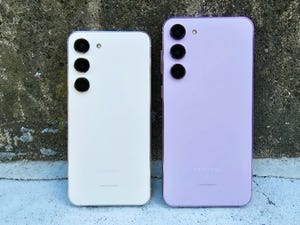
Samsung Will Let You Create an AI Copy of Your Voice to Answer Phone Calls - CNET
Too busy to pick up the phone? Samsung wants to address that by letting you create a replica of your voice using artificial intelligence.
The feature is only available in Korean and is part of Samsung’s Bixby Text Call service, which lets you answer a call by typing a text message instead. The announcement comes after Google has used the Google Assistant to automate certain parts of the phone-calling experience. It also arrives amid a surge in interest in AI-generated content, thanks to the rise of ChatGPT.
To be clear, Samsung’s new feature is not an AI clone that answers calls entirely on your behalf. Instead, Bixby Text Call lets you type a text message to answer a phone call at times when it may not be appropriate to do so verbally. Bixby then converts your typed text to audio for the recipient.
That feature was announced last year as part of Samsung’s One UI 5 update. Now, Samsung is launching the Bixby Custom Voice Creator, which would let users record sentences that Samsung’s Bixby assistant can analyze to create an AI-generated copy of their voice and tone. Samsung is positioning this as a means to customize the way Bixby Text Call converts texts into audio during a call. Bixby Text Call is also now available in English, although the voice-replication tool is only available in Korean.
Samsung said last year when announcing Bixby Text Call that recipients will hear an automated message notifying them that the call is being answered through Bixby. Samsung’s press release, however, doesn’t mention whether this applies to phone calls answered by personalized voices created through the Bixby Custom Voice Creator as well. It’s also unclear which Samsung has safeguards in place to prevent an AI-generated voice copy from being created through a recording of a person’s voice rather than the actual user. CNET has reached out to Samsung for clarification about both points and will update this story accordingly when we hear back.
Samsung did say last year that Bixby’s text-to-speech transcription process takes place on the device itself rather than in the cloud. Audio is also deleted right after the recognition process takes place, according to the company.
Samsung said in Wednesday’s press release that this AI-generated voice will eventually be compatible with “other Samsung apps beyond phone calls,” although it didn’t say which ones.
Samsung is broadening Bixby’s functionality after Google has rolled out a suite of features designed to make the phone calling experience more convenient in recent years. The company’s Direct My Call tool, for example, uses the Google Assistant to transcribe automated phone menus. Google recently updated this feature with the launch of the Pixel 7 last year.
At the same time, there’s been a deeper interest in how AI-generated content can be used in everyday tasks, resulting from the popularity of ChatGPT, the online chatbot from OpenAI that launched in late 2022. Microsoft recently incorporated the technology behind ChatGPT into its Bing search engine, which is currently available in a limited preview, to provide more conversational results. Google also announced its own ChatGPT rival called Bard.
Editors’ note: CNET is using an AI engine to create some personal finance explainers that are edited and fact-checked by our editors. For more, see this post.

